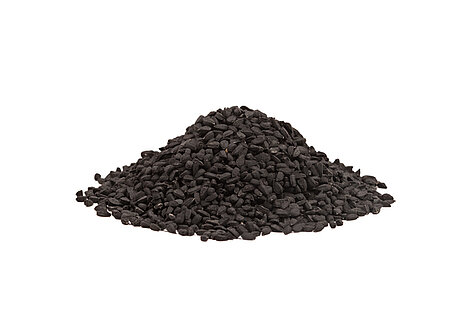Black cumin seeds

But what does this have to do with dogs? In this article, you will find out how black cumin seed can help your dog, what the benefits and disadvantages are and how to use it correctly.
Black cumin seed can have a positive impact on your dog's health and well-being. Here are some of the possible benefits:
- Boosting immunity: black cumin seed can support your dog's immune system and make it more resistant to disease. This is due to the antioxidants it contains, which fight free radicals, and the bitter substances that promote the formation of defense cells.
- Regulating the metabolism: Black cumin seeds can stimulate your dog's metabolism and improve digestion. This is due to the polyunsaturated fatty acids, which increase fat burning, and the essential oils, which have an antispasmodic and anti-inflammatory effect.
- Protection against parasites: Black cumin seeds can protect your dog from ticks, fleas and other parasites. This is due to the strong smell of the essential oils, which scares off the pests. Black cumin seed can also improve your dog's blood count and thus reduce susceptibility to parasites.
The disadvantages of black cumin seed for dogs
Black cumin seed may be a natural remedy, but that doesn't mean it doesn't have side effects or risks. Here are some of the possible drawbacks:
- Overdose: Black cumin seed should only be fed in small amounts, otherwise it can cause digestive problems, liver damage or blood clotting disorders. The recommended dosage is approximately one teaspoon per five kilograms of body weight per day (maximum six teaspoons).
- Allergy: Black cumin seed can trigger an allergic reaction in some dogs, which can manifest itself as a skin rash, itching or breathing difficulties. When you give your dog black cumin seeds for the first time, you should therefore pay close attention to possible signs of an allergy and, if in doubt, consult a vet.
- Interaction: Black cumin seed can influence the effect of other medications, especially those that thin the blood or lower blood sugar. If your dog is taking such medications, you should speak to your vet before using black cumin seed.
How to use black cumin seeds for dogs correctly
If you want to give your dog black cumin seeds, you should keep a few things in mind:
- Quality: Make sure you buy high-quality black cumin seeds that are free from harmful substances and additives. Whole seeds are best, which you can freshly grind or crush to activate the ingredients.
- Amount: Stick to the recommended dosage of one teaspoon per five kilograms of body weight per day (maximum six teaspoons). Do not exceed this amount to avoid side effects.
- Administration: Mix the black cumin seeds with some lukewarm water in the food bowl and offer them to your dog together with its usual food. Most dogs like the nutty, spicy flavor of the seeds, but if your dog doesn't like them, you can also hide them in a treat or mix them with some honey or cottage cheese.
- Duration: Don't give your dog black cumin seeds permanently, but only as a cure, for example for four to six weeks. Then take a break of at least two weeks before starting again. This way you can avoid habituation or overdosing.
- Observation: Observe your dog during the use of black cumin seeds and pay attention to possible changes in his behavior, digestion or blood count.
Black cumin seed is an old household remedy that can also have many benefits for dogs. It can strengthen the immune system, regulate the metabolism and protect against parasites. However, it should only be used in moderation and with caution, as it can also have side effects or risks.
If you notice any signs of hypersensitivity or poisoning in your dog, you should see your vet immediately. We are not a substitute for a vet, but we try to be as accurate as possible. Every dog reacts differently and we recommend you get a second opinion or consult your vet if in doubt.
Stay healthy and take good care of your four-legged friend!😊